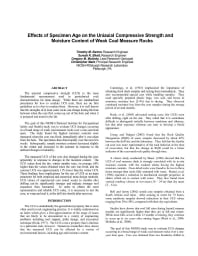Mining Publication: Effects of Specimen Age on the Uniaxial Compressive Strength and Moisture Content of Weak Coal Measure Rocks
Original creation date: July 2008
Authors: TM Barton, SK Bhatt, GM Molinda, C Mark
NIOSHTIC2 Number: 20034277
Proceedings of the 27th International Conference on Ground Control in Mining, July 29 - July 31, 2008, Morgantown, West Virginia. Peng SS, Mark C, Finfinger GL, Tadolini SC, Khair AW, Heasley KA, Luo-Y, eds., Morgantown, WV: West Virginia University, 2008; :332-337
The uniaxial compressive strength (UCS) is the most fundamental measurement used in geotechnical rock characterization for mine design. While there are standardized procedures for how to conduct UCS tests, there are no firm guidelines as to when to conduct them. However, it is well known that the strengths of at least some rocks can change during the time between when the core first comes up out of the hole and when it is prepared and tested in the lab. The goal of this NIOSH (National Institute for Occupational Safety and Health) study was to evaluate UCS changes occurring in a broad range of weak coal measure rocks over a one-year time span. The study found the highest moisture contents were measured when the core was fresh, immediately after it was taken from the hole. The specimens then dried rapidly over the next few weeks. Subsequently, sample moisture contents decreased slightly in the winter and increased in the summer in response to the ambient changes in humidity. The measured UCS of the core also changed during the year, apparently in response to changes in the moisture content. The UCS values from the dry, winter months were, on average, 60% higher than the values obtained when the core was fresh, and the summer UCS was approximately 11% lower than the winter UCS. These findings have implications for the use of UCS as an input parameter for both empirical and numerical mine design methods. UCS values of unprotected core tested weeks to months after drilling can be significantly stronger and indicate stronger roof sequences than warranted. In order to obtain the most representative and reliable UCS value, it is necessary to test the core, or wrap and seal it, at the drill site shortly after recovery.

NIOSHTIC2 Number: 20034277
Proceedings of the 27th International Conference on Ground Control in Mining, July 29 - July 31, 2008, Morgantown, West Virginia. Peng SS, Mark C, Finfinger GL, Tadolini SC, Khair AW, Heasley KA, Luo-Y, eds., Morgantown, WV: West Virginia University, 2008; :332-337
- An Analysis of Flexural Strength and Crack Width for Fiber-Reinforced Shotcrete Used in Weak Rock Mines
- Anchorage Pull Testing for Fully Grouted Roof Bolts
- Correlation of Sonic Travel Time to the Uniaxial Compressive Strength of U.S. Coal Measure Rocks
- Diagnosing and Controlling Moisture-Sensitive Roof in Coal Mines
- Field Performance Testing of Fully Grouted Roof Bolts
- Identifying Moisture Sensitive Roof Rocks in Coal Mines
- In Situ Estimation of Roof Rock Strength using Sonic Logging
- Investigation of the Anisotropic Confinement-dependent Brittleness of a Utah Coal
- Neural Network Technology for Strata Strength Characterization
- A Study on Effects of Size and Structure on Hygroscopicity of Nanoparticles Using a Tandem Differential Mobility Analyzer and TEM